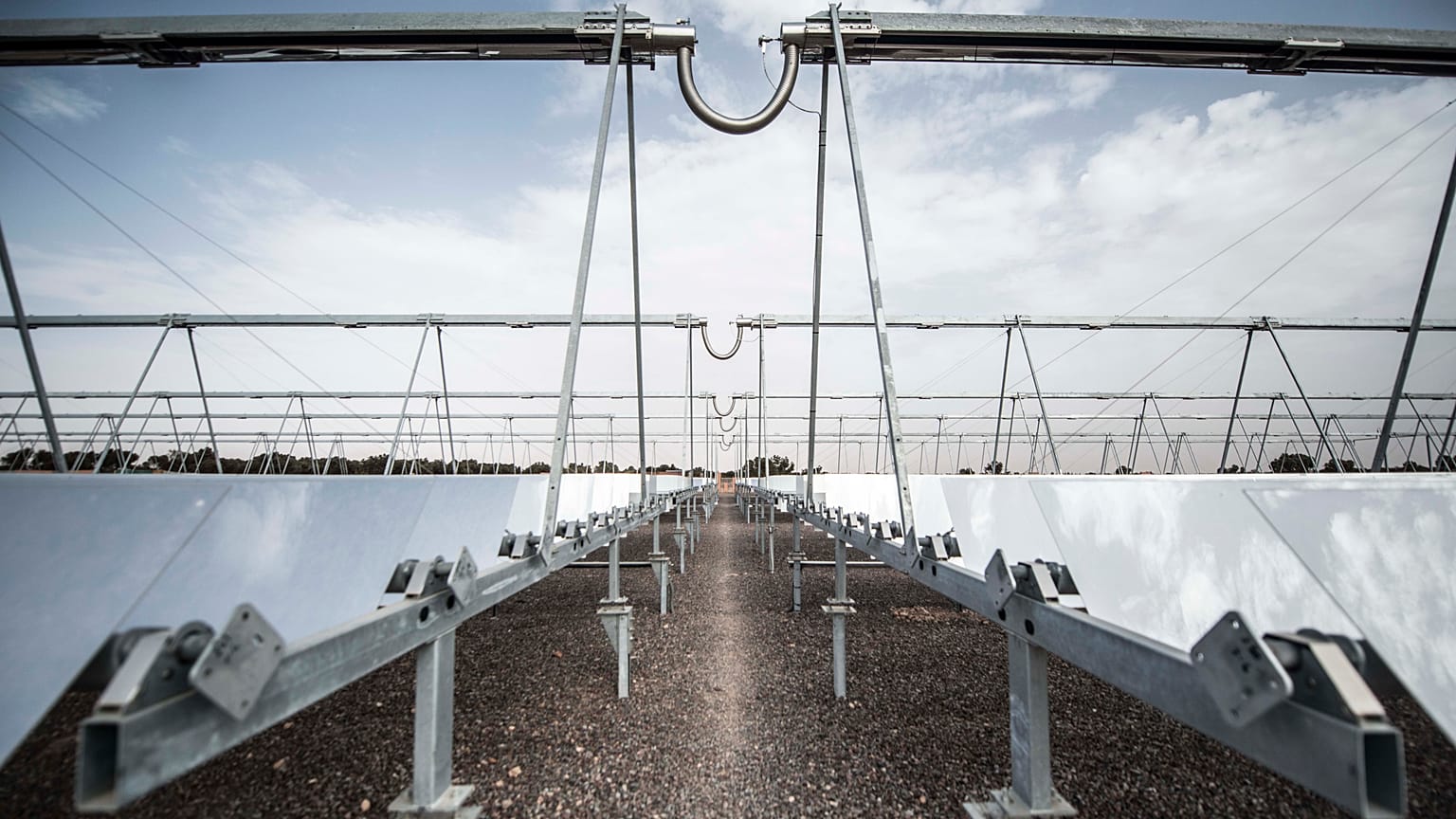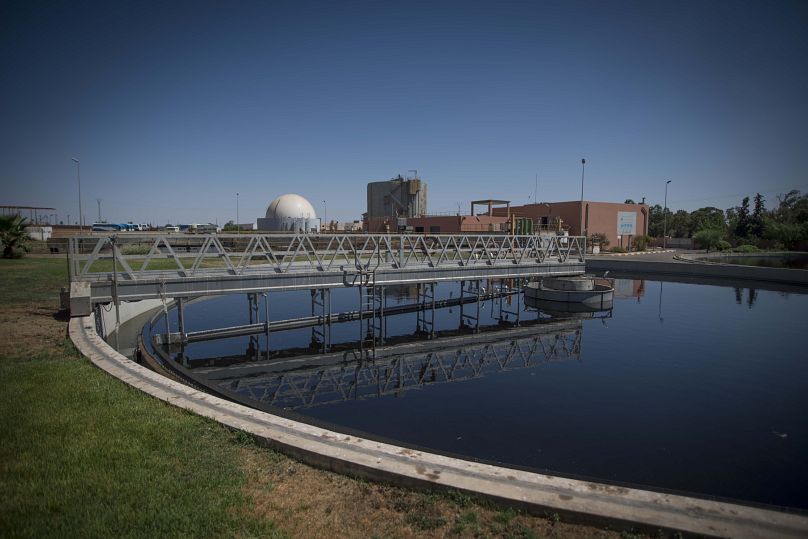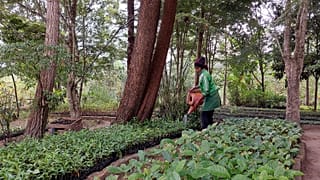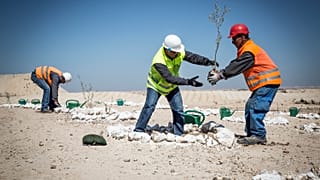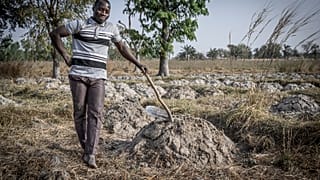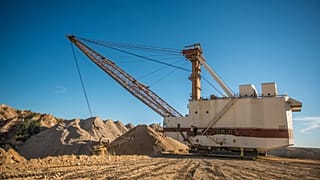As the world faces the joint demands of a growing population and an environmental crisis, Morocco’s OCP Group, the world leader in phosphate mining and fertiliser production, has redoubled its efforts to increase fertiliser production while reducing its carbon footprint.
 ADVERTISEMENT
ADVERTISEMENT
 ADVERTISEMENT
ADVERTISEMENT
As custodian of the world’s largest reserves of phosphate, OCP plays a key role in feeding future populations and takes the risks of climate change very seriously.
Humanity today consumes far more resources than the planet can offer, and the ecological damage will almost certainly get worse as a result of population and economic growth. OCP’s challenge is therefore to meet growing consumption needs in order to guarantee food security, while using a minimum of resources.
Mining and processing phosphate, however, is an energy-intensive industry, and OCP is investing heavily in research and technology that will make these processes as efficient and sustainable as possible.
“OCP is working to meet demand for phosphate, while at the same time rebalancing our environmental impact and converting it into positive opportunities for the wider community,” says Hanane Mourchid, OCP’s chief sustainability officer. “In order to achieve this target, we have implemented several roadmaps to meet our environmental, social and governance commitments, with the aim of achieving carbon neutrality by 2040, while meeting 100 per cent of our electricity needs through clean sources in 2026.”
Working towards sustainable models
OCP is committed to playing its part in curbing global greenhouse gas emissions in line with Moroccan and international sustainable development goals. This means, respectively, cutting 45.5 per cent of greenhouse gas emissions by 2030, and keeping global warming below 2ºC.
The group is also progressively aligning its sustainability report with the recommendations of the Task Force on Climate-Related Financial Disclosures (TCFD) to remain transparent on its path to carbon neutrality by 2040.
The company’s aim is not only to adapt its core activities, but to improve education and raise awareness internationally, focusing on climate change mitigation, adaptation, impact reduction and early warning systems. Its climate action and decarbonisation programme lays out a roadmap that ensures industrial development while staying on track to become carbon neutral.
To achieve its ambitious environmental objectives, OCP is joining forces with strategic institutional and economic partners in the private sector, such as the International Fertilizer Association (IFA) and the World Business Council for Sustainable Development (WBCSD), as well as organisations that monitor sustainability, such as the Science Based Targets initiative (SBTi), which provides assurance that the OCP decarbonisation strategy is in line with Paris Agreement goals and is supported by scientific evidence.
“The land sector is the source of 95 per cent of food and agriculture production, and is crucial for fighting climate change. OCP fulfils its role in halting soil degradation by promoting best management practices, investing in R&D and supporting efforts to incentivise farmers. These efforts aim to reduce global emissions and explore the full potential of land to help remove carbon dioxide from the atmosphere,” says Naoufal Mahdar, OCP’s vice president of climate action and decarbonisation.
Progress towards clean energy transition
OCP is making fast progress towards its target of meeting 100 per cent of its electricity needs through clean sources by 2026 and is already at 87 per cent. The company is increasingly able to source its energy from wind and solar, and is working on clean alternatives to its fossil fuel consumption (heavy fuel oil and natural gas).
OCP is currently constructing photovoltaic farms with the capacity to generate 1.2GW , and the first phase will be in service by 2024. In total, the company is investing US$2.3 billion in the energy transition program. Another key part of its energy plan is the adoption of energy storage. By storing clean power, OCP can make the most of windy and sunny periods and store power for nights or times when conditions are not as favourable.
OCP is also able to reuse the heat waste from its industrial facilities in order to generate clean electricity (cogeneration). In 2021, cogeneration at OCP produced more than 3,000 GWh of electricity, ensuring an excellent balance in energy management.
The group is also working to address the impacts of ammonia production, which currently accounts for more than one per cent of global CO2 emissions. Along with its partner, the Mohammed VI Polytechnic University, OCP is developing viable and practical green ammonia solutions (produced from renewable energy) to allow the substitution of imported ammonia (produced from fossil fuels) and additional solutions based on green hydrogen production.
Furthermore, OCP has created platforms dedicated to the research of sustainable solutions, which are exploring innovation projects in the field of clean energy and new energies.
Transforming water management
Higher average temperatures and more extreme, less predictable weather conditions, such as heatwaves, droughts and heavy rainfall, are increasingly impacting the availability, distribution and quality of water in Morocco, a country with water scarcity. OCP’s mining and processing sites both rely on water, and the group has developed a water management program hinged on water efficiency measures and the use of non-conventional water sources – treated wastewater and desalinated seawater – that will cover 100 per cent of its needs by 2026.
To meet the growing need for its fertilisers, OCP expects that its water consumption will triple by 2028. In 2008, the group began to phase out the use of fresh water in its operations, and has since embarked on an ambitious sustainable water programme, using innovative techniques and alternative sources that will enable it to bring the need for fresh water down to zero by 2026.
OCP’s incorporation of water from non-conventional sources increased from 3 per cent in 2010 to 30 per cent in 2018. Thanks to significant investment in this area (US$360 million so far), OCP has been able to build three wastewater treatment plants and a desalination plant for its own use.
“OCP’s water-management scheme is based on two pillars: rationalisation and the use of non-conventional water resources,” said Karim Saoud, OCP’s vice president of water and energy.
“The programme is designed to optimise our water use, transform our processes, and invest in the R&D that will find even better ways to reduce our water use. We work on smart products and practices to offer solutions for water-scarce agriculture. We provide spare capacity for local communities to respond to the urgent water crisis and enhance health and prosperity.”
“By combining urban wastewater treatment with desalination, we are making more freshwater available to the other consumers, notably for use as drinking water and for agriculture.”
Future desalination units, slated to be completed in 2022, will cover the water needs of its main sites in Jorf Lasfar and Safi. The water saved in this way will be redirected for use in the Oum Er Rbia basin and the towns of El Jadida and Safi.
Develop climate smart products & services
The ways in which the climate is changing, from rising temperatures to changes in precipitation, is increasingly impacting the way plants grow all around the world. To provide farmers with sustainable answers to the depletion of natural resources and increasing regulations, OCP is continuously improving its product and services to create smart agriculture embedding the 4R's nutrient stewardship framework – right source, right rate, right time, right place.
This is structured around: (i) Providing farmers with local infrastructures, such as blending and storage facilities, and minimising supply chain disruption due to weather. (ii) Developing customised products adapted to the evolution of the soil crop environment system and to seize opportunities for climate-smart products. (iii) Designing digital tools to enable farmers to make the right decisions.
